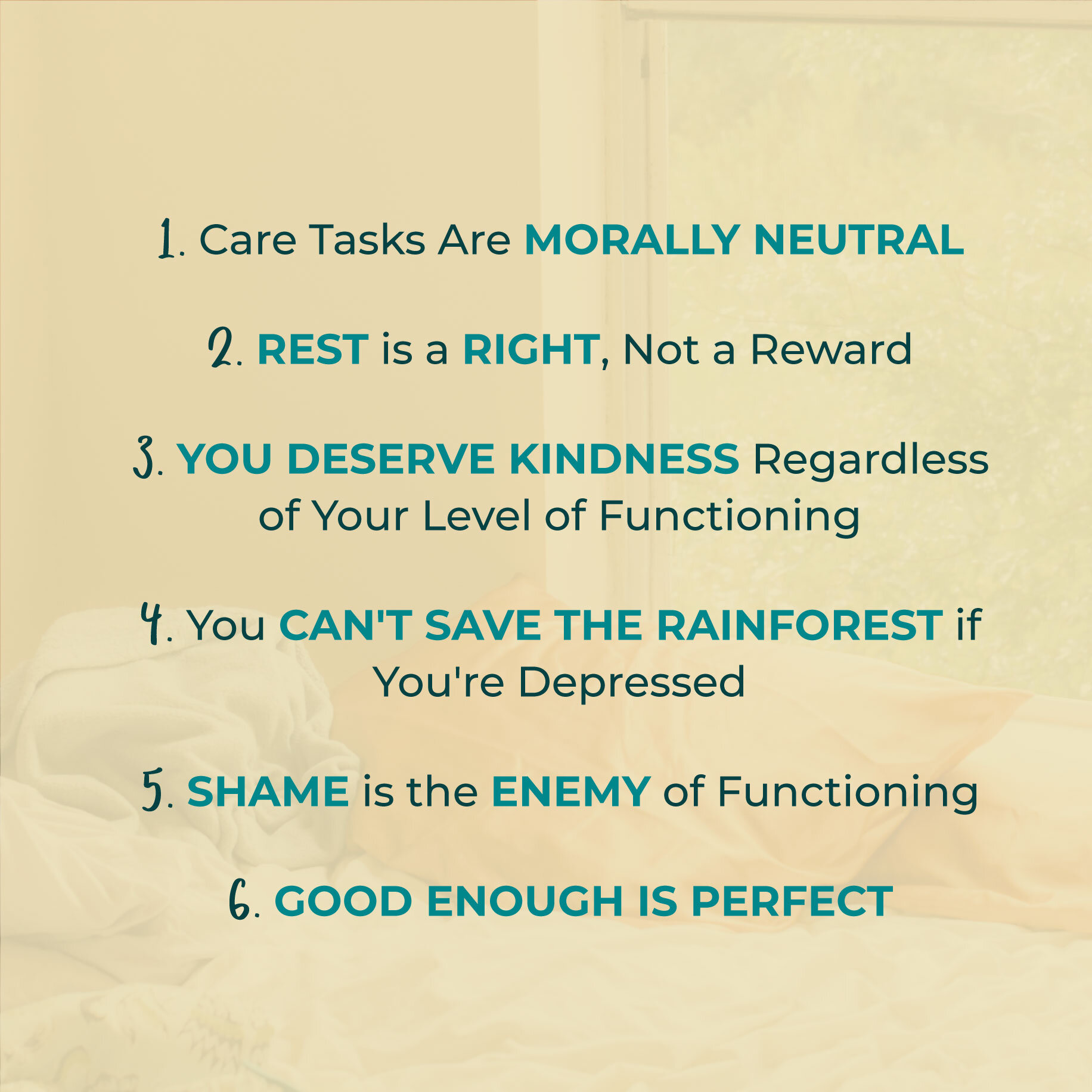
What are Care Tasks?
The visible and invisible load of care tasks
Care tasks describes any task, chore, or errand that is required to care for self and keep life going. Typically, these tasks are recurring, never-ending, and are required to be completed in order to "get on with living." The overarching tasks of feeding, cleaning, and health and hygiene (both on for yourself and those for whom you are responsible) may seem like simple or noncomplex tasks to most. But when you actually break down the amount of time, energy, skill, planning, and maintenance that go into care tasks, we begin to see that they are not always simple. For example, the care task of feeding yourself is not simply the act of putting food into your mouth. It is also making time to purchase that food, deciding what food to purchase, knowing what nutritional needs should be guiding your decisions, being knowledgeable on what foods meet those needs, planning how to prepare that food and setting aside the time to do so, ensuring that feeding comes at correct intervals, and taking into consideration health needs and preferences of all people you are feeding. It also requires the energy and skills necessary to plan, execute, and follow through on these steps every day, multiple times a day. It requires the coping skills to deal with any barriers related to one's relationship with food and weight, a lack of appetite due to medical or emotional factors, and the frustration tolerance to deal with any messes you may create in the process. You must have the emotional energy to deal with the feeling of being overwhelmed when you don't know what to cook, the anxiety it can produce to create a kitchen mess, and possibly the skills to multitask while working, dealing with physical pain, or watching over children.
We can do this same exercise with cleaning. Cleaning is an ongoing task made up of hundreds of small skills that must be practiced everyday at the right time and manner in order to "keep going on the business of life." First, you must have the executive functioning to deal with sequentially ordering and prioritizing tasks. You must learn which cleaning must be done daily and which can be done on an interval. You must remember those intervals. You must be familiar with cleaning products and remember to purchase them. You must have the physical energy and time to complete these tasks and the mental health to engage in a low-dopamine errand for an extended period of time. You must possess the faculties to process any sensory discomfort that comes with dealing with any dirty or soiled materials. "Just clean as you go" sounds good and nice, but most people do not appreciate the hundreds of subtle skills it takes to operate that way and the thousands of barriers that can interfere with learning or executing those skills properly.
Continuing on, health and hygiene are far more complex than "eat healthy and shower." You must possess the social skills to call the doctor and attend appointments. You must have the time and energy to fill prescriptions and again, the executive functioning to take them everyday. Even tasks that appear to be secondhand thoughts to most people--brushing your teeth, washing your hair, changing your clothes--can become almost impossible in the face of major mental illness, physical disability, or executive dysfunction.
Even when one possesses optimal mental and physical health, care tasks can become insurmountable in the face of some pretty simple life changes. Having a baby, losing a spouse, coming down with a debilitating illness, or having to pick up a second (or third) job can quickly make care tasks switch from something done on "auto pilot" to something that can only be done with purposeful thought and energy expenditure, of which someone in these circumstances may now have none to spare.
When barriers to functioning make completing care tasks difficult, a person can experience an immense amount of shame. "How can I be failing at something so simple?" they think to themselves. They are unlikely to reach out for help with these tasks due to intense fear of judgment and rejection. As shame and isolation increase, mental health plummets. Self-loathing sets in and motivation vanishes. The critical internal dialogue quickly forms a vicious cycle, paralyzing the person even further.

What is Spoon Theory?
And Other Ways to Conceptualize Capacity Limitations
Spoon theory was written by Christine Miserandino, who has lupus, an illness which causes symptoms that create pain, fatigue, and low energy. Spoon theory is used to describe the capacity limits people with chronic illness face. It posits that each person wakes up in the morning with a certain amount of "spoons" (energy capacity) and they must choose how to use them. A person with chronic illness has less spoons to work with than a healthy person, so they must decide what to use their remaining spoons on.
The Six Pillars of Struggle Care
Care Tasks are Morally Neutral
Care tasks are morally neutral. Being good or bad at them has nothing to do with being a good person, parent, man, woman, spouse, friend. Literally nothing. You are not a failure because you can't keep up with laundry. Laundry is morally neutral.
Rest is a Right, Not a Reward
You do not have to earn the right to rest, connect, or recreate. Unlearn the idea that "chores" (aka care tasks) must be totally complete before you can sit down. Care tasks are a never-ending list and if you wait until everything is done to rest you will never rest.
You Deserve Kindness Regardless of Your Level of Functioning
So much of our distress comes not from the unfolded laundry but from the messages we give ourselves. Lazy. Failure. Unlovable. You do not need to be good at care tasks to learn how to develop a compassionate inner dialogue. You deserve kindness and love regardless of how good you are at care tasks. Challenging these critical message you give yourself will go a long way in relieving your distress.
You Can't Save the Rainforest if You're Depressed
You are not responsible for saving the world if you are struggling to save yourself. If you must use paper plates for meals or throw away recycling in order to gain better functioning you should do so. When you are healthy and happy you will gain the capacity to do real good for the world. In the meantime, your job is to survive.
Shame is the Enemy of Functioning
Shame is a horrible long-term motivator. Most of the time it is paralyzing, compounding the barriers one already has to completing care tasks. This sets up a cycle where the uncompleted task creates shame, which in turn saps motivation and energy, pushing one only to avoid the task altogether. Even if we do manage to shame ourselves into action, we find that those who work in shame also rest in shame. Instead of relief, taking a break only brings feelings of guilt. Instead of doing care tasks out of a motivation of distress you can learn to do them out of a motivation of self-care. With compassionate inner dialogue and gentle skill building you can begin to create and enjoy a worthwhile life.
Good Enough is Perfect
Throw away what you think care tasks "should" look like and work towards a way of doing them that works for YOU. The goal is not to do them to Martha Stewart's standards. You should be aiming for good enough. The extra energy to move from good enough to hastaginstagramgoals could be better spent on something that really matters. That is why we don't say "good enough is good enough" but instead "good enough is perfect."

No One Has Limitless Capacity
Capacity Limits and Prioritization
Spoon theory is not just applicable to chronic illness. Every person has a unique capacity for completing tasks and makes daily decisions about what to accomplish. The difference is most young and healthy individuals have more than enough capacity to complete daily care tasks and only have to prioritize which "fun" or "extra" things they want to accomplish that day. I may have no issue waking, showering, dressing, doing laundry, feeding myself, answering some emails, and then grocery shopping with energy and time to space. So the question of "should I go to the beach or see a movie?" is a luxury one. However, when mental, emotional, social, or physical factors make it so that getting out of bed, feeding oneself, and showering take up a large portion of of one's energy and time, they must then prioritize how to use the remaining time. This is difficult because such a person is not deciding between the beach or the movies but between laundry and dishes, two necessary tasks. The task that does not get picked will still be there tomorrow and now there is a longer list but the same amount of limited capacity. Things build up quickly. Those looking in who take their generous capacity for granted may judge such a person for the dishes piled in the sink. "How lazy" they might think, "How can dishes be overwhelming?" What they do not comprehend is that it is limited capacity, not laziness, that leave dishes piled in the sink.
"If you can't even accomplish basic care tasks how do you function or go to work?" is a question once asked on a video I made about tackling overwhelming dishes. What this person failed to understand is that a person might be using every ounce of their physical and mental capacity to perform at work, only to come home running on fumes unable to function any longer.
It is not always a decreased capacity that creates this issue. Sometimes it isn't internal barriers to functioning that are the issue but seasons of life in which the load of care tasks has begin to overwhelm a person of even "normal" capacity. Every postpartum mother knows what it is like to have to decide between eating and showering. Newborn care tasks have laid claim to all but the last 1% of their time and energy and now they are forced to decide between two basic care tasks. Mothers of children of all ages often find themselves drowning in a sea of care tasks that seem impossible to complete in conjunction with their jobs, relationships, and other responsibilities. Working two or three jobs and trying to parent or participate in a relationship can take up so many spoons that care tasks become overwhelming.
If your load outweighs your capacity, then you must learn to prioritize which tasks to complete, find easier and more accessible ways of completing them, and and still allow yourself time to be "off."
things that limit capacity
AN INEXHAUSTIVE LIST
Mental Illness
Neurodivergence
Sensory issues
Physical disability
Chronic illness/pain
Postpartum
Single parent households
Grief and loss
Trauma
Emotional disorders
Caring for small children
Caring for special needs individuals
Financial distress
Abusive relationships
Systematic racism & oppression
Living through a pandemic
A Note on Sustainability & Environmentalism
You Can't Save the Rainforest if You're Depressed
People who struggle to function are not choosing between recycling and not recycling, they are choosing between letting the cardboard pile up and staying paralyzed and throwing the cardboard out and being able to get unstuck enough to move forward in gaining functioning. Either way the recycling isn't getting done that day. However, if we sacrifice one day of cardboard (or tupperware, or paper, or plastics) we may well have a chance at gaining a functioning human being capable of engaging in and making a difference in high level causes such as environmentalism.
Feeling shame for not being sustainable, for eating meat, or purchasing fast fashion when someone is struggling to get through the day is not going to cause them to magically gain the ability to do something different. Shame is a horrible long-term motivator. It is more likely to contribute to dysfunction and continue cycles of unsustainable practices. Feeling anger at someone with clinical depression or ADHD for not engaging in eco-optimal behaviors is also misplaced. The overwhelming majority of environmental damage is done by a few companies. Individual consumer habits have absurdly little impact and there is no ethical consumption under capitalism.
One of the major tenets of health professions is harm reduction. No one is made functional overnight and some people may always have barriers. The goal then is to take steps that reduce harm, first to self, then to those individuals around us, then to our community. You cannot jump right to community harm reduction before first addressing individual harm reduction. Therefore, if a newly widowed woman struggles to eat, she is released from the obligation to eat ethically. Not because eating ethically is unimportant but because when the real world choices for someone are eating dairy or eating nothing, it is always the ethical choice to eat. It is always the ethical choice to encourage that person to eat whatever they can manage. Harm reduction is always ethical.
Now that you understand why this approach of harm reduction is what's best for both the person and the earth, if you continue to shame those with functional barriers for not being "sustainable" then you must reconcile with the fact your activism is nothing more than performance art.
Please enjoy this song I wrote on my kitchen floor and be kind to yourself.



